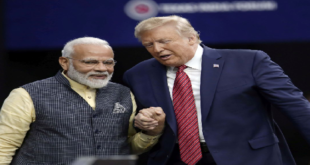18-07-2022
Bureau Report
NEW DELHI: Indian traders and shopkeepers will hold a nationwide protest next week against a hike in taxes on a range of products and services, including food grains and household items, that went into effect on Monday, a top official of a leading traders’ group said.
 “The 5% tax on a range of food products which remained tax-free so far and hike in rates on other household items has increased the inflation burden on the public and traders,” said Pravin Khandelwal, president of the Confederation of All India Traders, which represents more than 10 million small shopkeepers and wholesalers.
“The 5% tax on a range of food products which remained tax-free so far and hike in rates on other household items has increased the inflation burden on the public and traders,” said Pravin Khandelwal, president of the Confederation of All India Traders, which represents more than 10 million small shopkeepers and wholesalers.
He said the group’s members would launch a nationwide series of protest meetings on July 26, starting in Bhopal, a state capital in central India and a stronghold of Prime Minister Narendra Modi’s ruling Bharatiya Janata Party.
Small traders and shopkeepers are a key constituency for Modi, who introduced the Goods and Services Tax (GST) system in 2017 to replace about 20 federal and state taxes and to help unify Asia’s third-largest economy.
A tax increase was approved last month to 18% from 12% for certain goods and services, including kitchenware.
 A finance ministry statement on Monday said the tax measures would include extending a 5% tax already imposed on branded food items such as rice, wheat, flour, pulses and dairy products to unbranded items sold in packages of up to 25 kilograms or 25 litres.
A finance ministry statement on Monday said the tax measures would include extending a 5% tax already imposed on branded food items such as rice, wheat, flour, pulses and dairy products to unbranded items sold in packages of up to 25 kilograms or 25 litres.
Analysts have said that higher taxes would put an additional burden on households that already face surging food and energy prices.
India’s consumer price inflation hit an eight-year high of 7.79% in April and remainded above 7% in May and June.
While traders have said Modi’s GST was an improvement over the previous complicated tax regime, they have also raised objections to some elements, such as the compliance burden for small retailers.
According to a report the statistic shows the inflation rate in India from 1987 to 2020, with projections up until 2027. The inflation rate is calculated using the price increase of a defined product basket. This product basket contains products and services, on which the average consumer spends money throughout the year. They include expenses for groceries, clothes, rent,  power, telecommunications, recreational activities and raw materials (e.g. gas, oil), as well as federal fees and taxes. In 2020, the inflation rate in India was around 6.18 percent compared to the previous year, figures are also available on India’s economic growth for additional information.
power, telecommunications, recreational activities and raw materials (e.g. gas, oil), as well as federal fees and taxes. In 2020, the inflation rate in India was around 6.18 percent compared to the previous year, figures are also available on India’s economic growth for additional information.
The Indian economy is gripped by unprecedented inflation. According to official data, the annual inflation rate in India increased to 6.95 per cent in March 2022, the highest since October of 2020. Similarly, the wholesale price index in March at 14.5 per cent, was the second highest since 2012.
Evidently, India’s economy faces a twin challenge because the current spike in inflation is the result of the steep price rise of crude oil (crude petroleum had risen to 83.56 per cent in March from 55.17 per cent during February) and other commodities across the world. This has increased the import cost for some of the essential commodities. Moreover, following the Russia-Ukraine war, there has been a disruption in the global supply chain. Notably, India meets 85 per cent of its oil needs from imports.
 Pressmediaofindia
Pressmediaofindia




